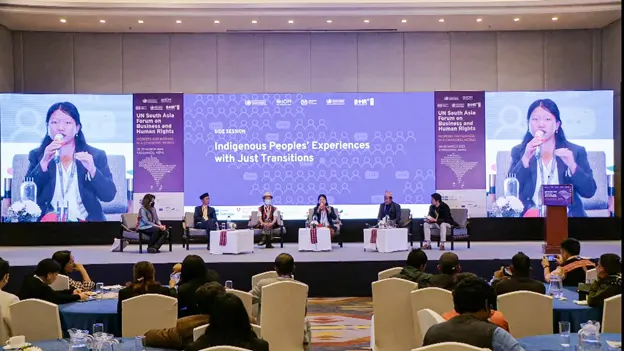ITANAGAR, 24 Mar: Representatives from Arunachal Pradesh – Tasik Pangkam, Bhanu Tatak and Ebo Mili – attended the 4th edition of the United Nations Business and Human Rights Forum, which was held in Kathmandu, Nepal.
Pangkam represented the Siang Indigenous Farmer’s Forum (SIFF), while Tatak and Mili represented the Dibang Resistance and Indigenous Rights Advocacy Dibang (IRAD).
During the forum, Pangkam submitted a memorandum to Dr Pichamon Yeophantong, the chair of the UN Working Group on Business and Human Rights. Pangkam spoke about the 10,000 mw dam over the Siang river, emphasising the socioeconomic anxieties for the future pertaining to mega dams over the Siang.
The SIFF president highlighted that the forum, over the past 13 years, has sent representations to the high court, the prime minister of India, the Arunachal government, the Arunachal governor, and the Human Rights Commission of Assam.
Tasik reiterated that the Adis of Siang cannot accept the 10,000 mw dam proposed in their ancestral territory, saying that it threatens the very existence and identity of the Adis.
Tasik implored the UN working group and other international environment and indigenous people’s agencies, downstream Assam and Bangladesh, and all concerned to help in opposing and cancellation of the 10,000 mw dam over the Siang.
Bhanu Tatak presented three cases of hydropower in Arunachal – the 2,880 mw Dibang multipurpose hydroelectric project (HEP), the 10,000 mw Siang HEP, and the recently cancelled in its current form, the 3,097 mw Etalin HEP.
She highlighted the National Hydroelectric Power Corporation’s (NHPC) “very bad track record and violation of indigenous people’s rights, especially in the states of Sikkim, Assam, Manipur and Arunachal Pradesh in the Northeast region of India.”
Tatak informed that a public interest litigation filed in the Gauhati High Court’s Itanagar permanent bench by the SIFF “received the jurisdiction in favour of SIFF.”
“Despite this, the NHPC is still conducting surveys and studies across Siang without people’s consent,” Tatak said.
She spoke also about the 2,880 mw Dibang multipurpose dam and “the unavailability of its climate feasibility and downstream impact assessment report.”
The cancellation of the 3,097 mw Etalin dam in its current form, as per Tatak, “is attributed to the people of Dibang and experts collective and their timely intervention in reviewing the environment impact assessment, namely ‘The Devil is in the Detail: Peer review of WII Seasonal Study on Etalin’, demanding cumulative impact assessment of several dams over the Dibang and the economic non-viability of such projects.”
Tatak expressed concern over why, despite the non-feasibility of such mega dams, they are still being pursued by the Indian government.
Touching upon the climate anxieties of the future, Tatak highlighted the Kaptai hydroelectric project in Bangladesh that displaced the indigenous Chakmas, who are forced to become climate migrants in indigenous territories of Arunachal, “which is leading to unwanted confrontations between both the vulnerable communities.”
The mega dams in Arunachal in Lower Subansiri (2,000 mw), Siang (10,000 mw) and Dibang (2,880 mw), if sanctioned, have the potential to displace and imbalance more than 1 million lives in Arunachal and downstream Assam, which will intensify forced migration and unskilled and informal labourers, denting the nation’s economy and performance.
Tatak spoke about the arrest of Mili and Neelim Mahanta for the ‘NO MORE DAMS’ graffiti on civil secretariat wall in Itanagar.
“Violation of human rights and indigenous people’s right to self-determination is a cause of concern in the dialogue of hydropower in Arunachal Pradesh, where more than 200 MoUs were signed by the government of Arunachal Pradesh with private sector and PSUs without any consultation or consent from the natives/indigenous of the region,” she said.
Tatak also commented that “the 2,880 mw Dibang multipurpose HEP, without having met the initial forest clearance, should ideally go back to the preliminary stage of consultation with the affected public.”
She insisted that proper downstream impact assessment should include people from the Dibang and the Brahmaputra floodplains as project-affected families bear the cost of displacement and land insecurities, without any compensatory or remedial measures by executing development agencies.
Mili asked about “the role of the UN in defending the defenders,” and gave examples of journalists and activists being harassed by the state and branded as antinational. He also quoted an article published on ‘The Third Pole’ on 7 April, 2020, in which the chief minister of Arunachal stated that “… any opposition to development projects is antinational” and warned that he had already instructed the intelligence bureau to act against any officials found misguiding people.
The United Nations South Asia Forum on Business and Human Rights, which was held from 22-23 March, provided an opportunity for participants to discuss the challenges faced by workers and employees in Asia, and violations of human rights associated with it.
During the three-day programme, representatives from various civil society organisations, governments and businesses across South Asia discussed their respective country’s actions to promote and follow the guidelines of the United Nations Guiding Principles on Business and Human Rights, as well as the International Labour Organisation.




